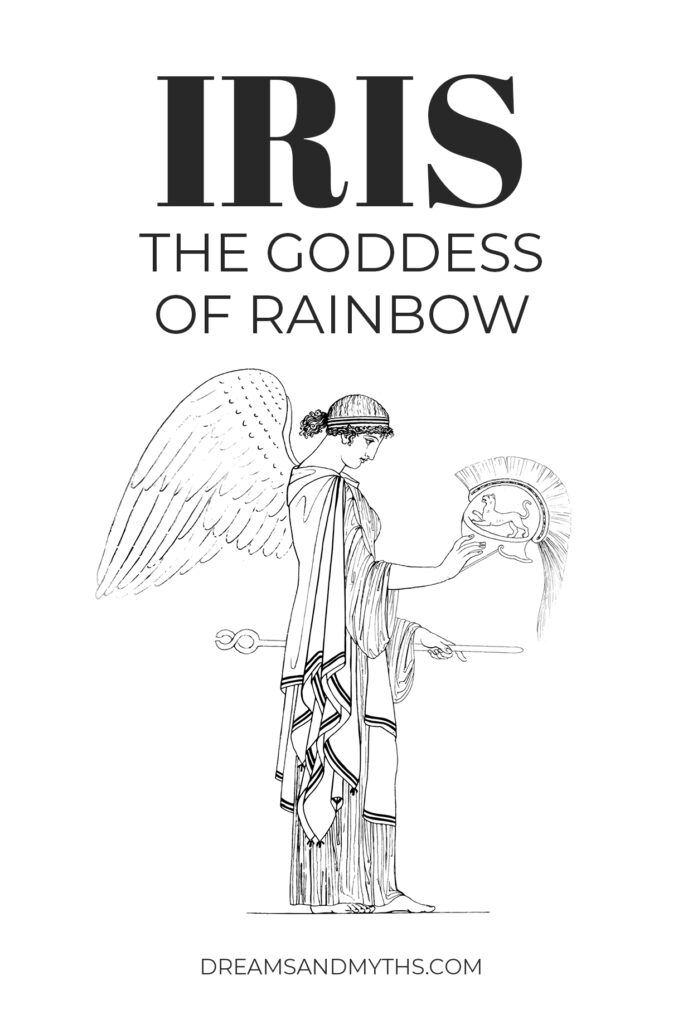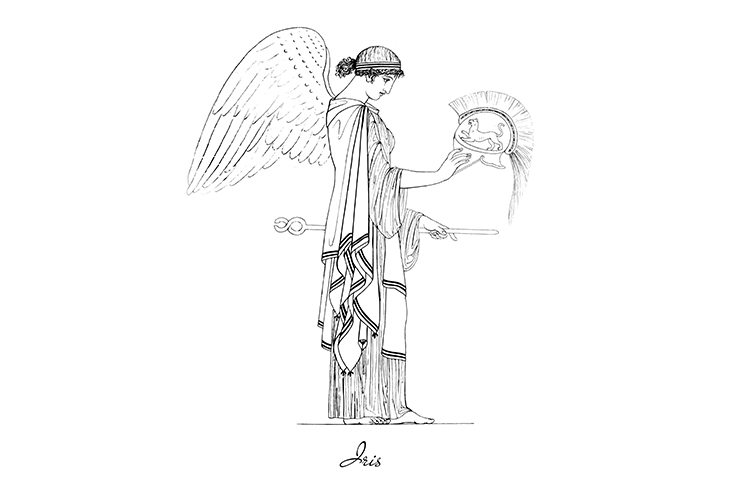Iris was considered to be the Greek Goddess of the rainbow or like a personification of the rainbow itself.
She is also considered to be a messenger for the Gods, but then it is noted that in the later ages, the role was given to or taken up by the God Hermes, and Iris became the handmaiden of the Goddess Hera.

She is also sometimes referred to as the Goddess of the Sea and the sky.
Iris’s Family
| Father | Thaumas (the wondrous), a marine God |
| Mother | Elektra ( The amber) was a Nymph of the clouds |
| Sisters | The harpies Arke and Ocypete |
| Consort | Zephyrus (The God of the west wind) |
| Children | Pothos |
Iris is derived from the Greek word iris, which means the rainbow but is also associated with the word “eiris,” which means messenger. This may be the reason why she is given the title of the rainbow and the messenger. She is the one who delivers the message from the clouds to the sea, from the Gods to the mortals, and from the heavens to the underworld.
The ancient Greeks were seafaring in nature. The coastal dwelling Greeks always saw a rainbow stretching from the sea to the clouds, as were the ways of nature. This resulted in the myth which said that Iris was responsible for replenishing the rain clouds with water from the sea. This basically was one of the first ways of describing the evaporation of seawater resulting in freshwater rains and rain cloud formation.
Depiction of Iris
The Goddess Iris is depicted as having two golden wings in certain arts. She holds a Herald’s rod in her hand and is often seen standing near Hera or Zeus. Sometimes she also has a pitcher in her hand through which she might serve nectar to the Gods. Hence she is also referred to as the cupbearer of the Gods.
Iris and Demeter
When Persephone had been kidnapped by Hades, Demeter withdrew herself into her temple in Eleusis and mourned the loss of her daughter. As the Goddess of agriculture was no longer there, the plants started dying, the world became barren, and every living creature was dying out of starvation.
At this crucial moment, Zeus sent none other than Iris to carry a message to Demeter to request her to resume her duties so that the world would no longer suffer. Iris went to Demeter and relayed to her the message which Zeus had sent her, stating that the God of Olympus himself requested her to lift her curse on the lands and join the Gods back by their side, but as Demeter had not found her daughter, she did not relent. Iris failed to persuade Demeter to return to her duties and end her moaning.
Messenger Iris and the War Between the Titans and the Gods
Iris was the messenger of the Gods during the tectonic battle between the gods and the Titans. Her sister, though, betrayed the Gods and became the messenger for the Titans. So both sisters Iris and Arke became messengers for opposing sides during the war.
Zeus, during the course of the war, tore her sister’s wings and gifted them to the Nereid Thetis on her wedding day. Thetis then passed it on to her son, Achilles, the hero of the Trojan war.
Messenger Iris and the Labor of Leto
When Leto was about to give birth to her children Apollo and Artemis, Hera was livid when she found out about her relationship with Zeus. She pursued her to no end and caused great pain to Leto. None of the cities were willing to be the birthplace of Apollo. Leto roamed the land for a place to give birth. Hera had sent Iris to every city to inform them to deny entry to Leto or else suffer the wrath of Hera. Leto suffered for nine days and nights, unable to give birth.
All the Goddess had gathered for the birth of the twin children except for Hera and Eileithyia(The Goddess of childbirth)
As Eileithyia was not present, Leto could not give birth. This is when Leto manages to bribe Iris by giving her a necklace and asking her to fetch Eileithyia without the knowledge of Hera. Iris carried the message to Eileithyia, and upon the arrival of the Goddess, Leto gave birth to her twin children. (This is one of the accounts as to how it happened)
Some myths go as far as to state that Iris was too loyal to Hera and functioned as her hunting hound, with her eyes always ready and sharp and her ears erect for any orders or commands from the wrathful Goddess.
Iris and the Argonauts
The Argonauts Zetes and Calais were pursuing the Harpies who had been tormenting Phineus, the seer. The sun God Helios had set the harpies upon him as his wrath. Phineus then formulated a plan with the Argonauts and sat down as bait with food in front of him.
The Harpies swooped down and took the food and were pursued by Zetes and Calais to the island of Strophades (Previously named the floating islands but now referred to as the turning islands). Here they were about to kill the Harpies when Iris appeared in front of them and forbade them from killing her brethren.
In return, she promised the Argonauts that the Harpies would no longer torment Phineus and that she would vouch for them. She swore an oath in the name of the river Styx that the Harpies will not harm the seer and that the Harpies are but the hounds of Zeus, and killing them would be going against the will of the Gods. On this oath, both the Argonauts turned back and left to meet their comrades. In doing so, Iris saved the life of her sisters, and they parted ways, flying away in different directions.
Iris and Lyssa and the Madness of Hercules
Lyssa was the spirit of Madness, rage, anger, and frenzy. When Hera was upset and angered about Hercules, she sent Iris to inform Lyssa to inflict the hero with insanity. When Iris delivered her the message, Lyssa was reluctant and tried to reason with Iris to not allow this to happen, but as Iris stood there steadfast.
Lyssa had to relent and follow the orders of the Potent God. This resulted in Hercules killing his wife and children and began the legendary stories of Hercules and his Labors. ( Lyssa also represents rabies in animals, with the name of the virus being Lyssavirus, which is the cause of rabies).
Iris and the Trojan War
Iris is only mentioned in Homer’s Iliad and not the Odyssey about the happenings in the Trojan war.
In one of the scenarios, she is sent by the God Zeus as a messenger to his brother Poseidon to stop his engagement in the war and to return back to his abode. Poseidon, angered by his brother’s commands, complained to Iris about it when she spoke to him about the scenario in which the message was relayed, and Poseidon relented and obeyed the command.
In another scenario, she is found to bring a message to Achilles from the Goddess Hera, unknown to Zeus and the other gods. When Achilles prays for strong winds to set the funeral pyre ablaze for his friend Patroclus, she grants it by swiftly going as a messenger to the winds, where her consort Zephyrus grants it. Thus the burning of the pyre of Patroclus happens, to which Achillies thanks Iris for her participation and help.
There are also records where Iris is sent as a messenger from Zeus to his son Dionysus on his travels in Asia. Here Iris mentions and relays the message of Zeus, which informs Dionysus that it is important that he succeed in his mission of conquering the Indians and bring the proud race to understand their aspect of justice, and only his success would guarantee his proud return to Olympus.
Verdict
All in all, Iris plays a vital role in Greek mythology, functioning as the messenger of the Gods. Although in later versions and mentioned by historians, the role is taken up by Hermes. Iris still holds an important position with regard to her contributions to various events in Greek mythological history.
She is regarded as the primary messenger of God, who later on gave the title to Hermes and retreated to Mount Olympus to personally serve the Goddess Hera. Although she does not have many heroic feats or tasks, the very fact that most of these feats took place and were even mentioned in ancient Greece was the foundation of Iris.
The Goddess of the rainbow and the Messenger had relayed the message to every corner of the world, thus cementing the feat in the memories of those to whom the herald was delivered, which later would become the myths and legends to be passed on by those who first saw and heard of it, to the ones who will later inherit the world from them.
